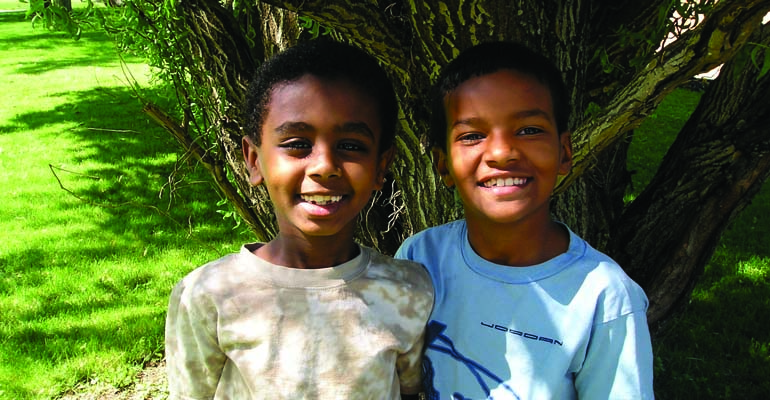Two years ago I was at a four-way stop, when the van began shaking. It was like an uneven load of wash about to abort its cycle. In the mirror I could see my sons, Yakob, 2, and Ayalkbet, 3, flailing their arms and legs in time to Bruce Springsteen’s “Born in the U.S.A.,” and, amazingly, Ayalkbet was singing along. I pondered the implications. He had memorized a song in English, even though he had no idea what the words meant. Then they noticed me watching them and really started going nuts. From that moment on, music became our connection.
Let me rewind. On the night of their homecoming, three weeks earlier, I offered my new sons a CD of Ethiopian children’s songs, but I quickly discovered that they preferred rock and roll. In the next months, our van’s music selection — Springsteen, John Denver, and Carole King, among others — stayed the same through frequent shopping trips and doctor visits. Many of the songs became family classics.
Their first concert was The Temptations. We watched it under a star-filled sky in Arizona. The boys were on their feet during the whole show.
Despite the fun we were having, my parental censor kicked in — the kind that, 50 years ago, might have thought Elvis’ music was sinful. I brought home a kid’s book by John Lithgow. The story went over O.K., but when I played the CD of Lithgow singing, the boys looked at me as if I had just said it was time for a nap.
Worried about the trend I had set in motion, and also curious about the boys’ verbal skills, I met with a linguistics professor at a nearby university. A native of Ghana who watched his own children become Americanized, Dr. Samuel Obeng assured me I wasn’t a bad mom just because my sons had traded in their native language, Amharic, for Blink-182.
Still, my husband and I were torn about seeing the boys’ first language dissolve. Before they came home, we learned about 40 Amharic words: enat (mother), abbot (father), and so on. We contacted universities and bought Amharic-language software. In the end, however, we decided that the boys’ quick adaptation to American culture and our lack of Amharic language skills meant a bilingual upbringing wasn’t practical.
It’s been more than two years since the Springsteen incident, and we’re on the road again. Yakob is playing the drums with a plastic bottle, Ayalkbet with a kaleidoscope, and I’m banging my hairbrush against the steering wheel. We’re jamming so hard to the Beastie Boys that people are staring, but I don’t care. At this moment nothing can touch us.
Tomorrow we’ll buy a drum set.
Music is different for me now that Yakob and Ayalkbet have rocked my world. Music accelerated their learning a new language and became a touchstone in our family. When all else fails, we can dance.



